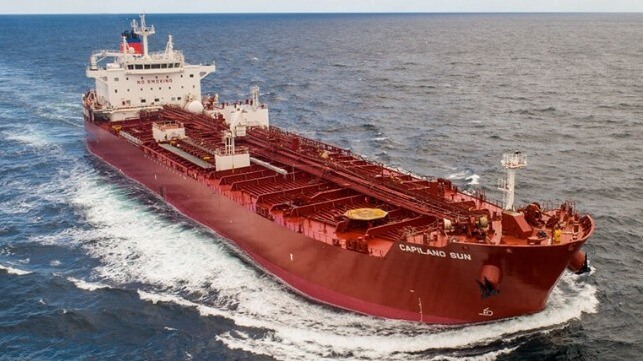Japanese Alliance to Develop First Domestic Methanol-Fueled Tanker

In a further effort to develop methanol-fueled ships and the technologies required to advance the decarbonization of shipping, six Japanese companies announced they are forming a strategic alliance to develop Japan’s first methanol-fueled domestic tanker. The vessel development project, which targets delivery of the ship in 2024, was also selected to receive public funding through the Japanese Ministry of Economy, Trade and Industry and Ministry of Land, Infrastructure, Transport and Tourism in projects designed to support energy-saving ship designs and high-efficiency propulsion systems.
The six partners will each contribute from their unique expertise to support the development of the new vessel. Mitsui O.S. K., which highlights that it operates nearly a third of all the dual-fuel vessels capable of burning methanol in service today, will be the vessel owner and build on its current experience with methanol-fueled vessels. Tabuchi Kaiun Co. and Niihama Kaiun Co. will responsible for the management of the new vessel, while Murakami Hide Shipbuilding Co. will draw on its experience in building tankers. Hanshin Diesel Works will develop the engine based on their current designs as the first company to develop a methanol-fueled low-speed 4-stroke diesel engine.
According to the companies, methanol has outstanding properties for use as a fuel, as it is liquid at normal temperatures and normal air pressure. In addition, they noted that methanol can be produced with CO2 and hydrogen as raw material, so in the future, it can be produced by utilizing the CO2 capture and transport business to synthesize hydrogen, which uses electricity derived from renewable resources such as offshore wind power and wave power. If this methanol can be used as fuel, it can establish an environmental circulation-type business model, enabling a reduction in net CO2 emissions.
MOL currently operates four of the approximately dozen dual-fuel methanol tankers in operation. The MOL Group, which set a target of achieving net-zero GHG emissions by 2050, is testing a variety of technologies including an announcement last month that they were operating the bunkering vessel Techno Star on biodiesel made through a process of combining collected waste cooking oil with methanol.
Last summer, MOL announced it was acquiring a minority stake in Methanex Corporation’s Waterfront Shipping subsidiary. Waterfront Shipping has been a pioneer in methanol-fueled ships, launching the first vessel in 2016 and announcing in 2020 that it plans to grow its fleet of 11 methanol-fueled ships with the construction of eight new 49,000 ton methanol dual-fueled tankers as part of a fleet renewal program. MOL took delivery on the 49,999 dwt methanol carrier Capilano Sun built by Hyundai Mipo Dockyard in South Korea. The vessel, which can operate either on heavy oil or methanol, is 610 feet long has a tank capacity of more than 52,000 cm. It is being operated by Waterfront Shipping under a long-term charter.

that matters most
Get the latest maritime news delivered to your inbox daily.
Maersk, which is also working to develop methanol as a maritime fuel says that green methanol is the only market-ready and scalable solution available today for shipping. The Danish company is developing sources for the fuel announcing yesterday that it has formed six partnerships that would create a supply of green, bio- and e-methanol from newly developed plants in North and South America and China. The company is also supporting development projects in Europe to create a steady global supply of methanol fuels in time for the introduction of its large dual-fuel methanol containerships due to enter service in 2024.
